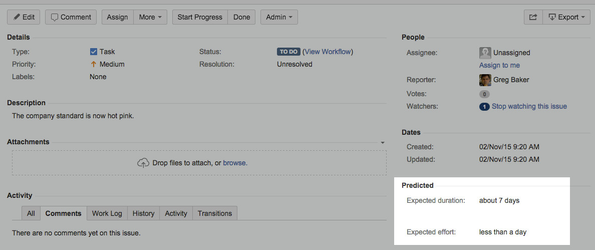01 Using AEED
AEED will supply a prediction for every open ticket. The prediction will appear on the right hand side of the ticket.
There are two predictions:
- Expected Duration: This is how long it is likely to take from the day that the ticket was created until the ticket is resolved (or closed, whichever comes sooner).
- Expected Effort: If you are using time tracking and recording work effort on tickets, this will show an estimate of what the work effort counter will show when the ticket is resolved.
Possible Errors
- Incident not found in the prediction system. AEED synchronises the contents of your JIRA instance with its own internal database. For some reason, the ticket that you are viewing at the moment is not in AEED's database. Any kind of modification to the JIRA will cause a resync to be triggered, such as adding an Activity Comment, modifying the Description and then putting it back again, and so on.
- Insufficient data for duration model. AEED will need at least 25 tickets to have been resolved or closed before it can start making any kind of estimates. Models are rebuilt during the weekend, so if you have just started using JIRA you might need to wait until the following week after you reach 25 tickets before you start seeing predictions. If you have more than 25 tickets and you are still seeing "Insufficient data for duration model" even though you have 25 closed tickets, log a ticket ( https://ifost0.atlassian.net/servicedesk/customer/portal/2 ) so we can fix it.
- Insufficient data for effort model. AEED will need at least 25 tickets which have some work hours logged against them to have been resolved or closed before it can start making predictions.
- Duration prediction pending or Effort prediction pending. This should disappear in a few moments; it means that the AEED has all the data it needs to make a prediction, but there is a backlog of work to catch up on.
- Duration prediction out-of-date or Effort prediction out-of-date. This should disappear in a few moments; it is the same as "duration prediction pending" except that a prediction has been generated in the past.
